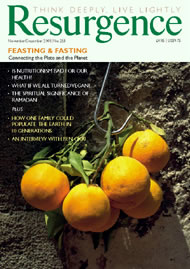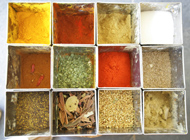FASTING, OR UPVAAS as we call it in India is a vital element of balance and harmony, not just at the level of the body, but between the body, the Earth and the cosmos. Fasting heightens our gratitude and awareness of food, and makes eating a sacred act.
Fasting has been used for the purification of the body, mind and soul. The body is purified by letting it rest and allowing it to cleanse itself through self-regulation. The mind is purified by the cultivation of self-control. The discipline of eating is not just a biological discipline, it is also a mental discipline. Above all, it makes us aware of the sacredness of food, the sacredness of our body and the connection of our food and body to the universe.
In India, days of fasting are linked to the new moon and full moon and to different days of the week dedicated to different deities. Navratra, the festival of nine nights is dedicated to the worship of the mother goddess in her diverse manifestations as Shakti, Devi, Durga, Lakshi or Saraswati. During the Navrati fasts, foods that are avoided are onion and garlic, cereals like rice and wheat, lentils and pulses, spices such as turmeric and hing, mustard and fenugreek.
However, the Navratra fast is a feast of lesser known foods and vegetables. At our ‘Seed School’ in Northern India, we have used the Navratra fast to promote the conservation of what we call “forgotten foods”. The fast replaces cereals with ‘pseudo-cereals’ such as amaranth, buckwheat and millets or the flour made from water chestnuts. The fast thus connects us to the cosmic energy of creation, it helps conserve biodiversity in our farms, and above all it provides us with fasting foods rich in micronutrients and trace elements. The fast thus provides nutritional balance.
Fasting brings nutritional balance by moving us beyond the monocultural diet of everyday. In the tridosa theory of Ayurveda, health is a result of balance between vata – derived from ether and air, pitta – derived from fire, and kapha – derived from earth and water. When fasting is prescribed for different days of the week, with a special diet related to the fast, it contributes to health and wellbeing. Thus Tuesday is dedicated to god Hanuman, born from wind, and associated with vata. During the Tuesday fast, no salt is eaten and cereal is eaten only once a day. These are precisely the measures for keeping vata in balance.
Many fasts are linked to harvest festivals. They connect us to Gaia’s cycles and rhythms and to earth community and the social community. The Pongal festival in South India includes the cooking of Pongal and sharing it in a feast. Pongal actually means ‘boiled over’, to symbolise abundance. The dish pongal is made of seasame seeds, jaggery (sugar syrup), chickpeas, groundnut, dried coconut and rice.
The Chhat ‘puja’ to the sun is also a harvest festival popular in Bihar in which a twenty-four hour fast ends with community eating. Krishna’s birthday, Janmashtmi is celebrated with a fast till midnight and is broken with a feast of diverse dishes especially sweetmeats made from milk and curd because Krishna as a cow heard loved milk and curd.
Fasting and feasting are two aspects of a balance between discipline and celebration, between the experience of limits and the gratitude for a shared abundance. The fasting takes us inwards to create our inner discipline. The feasting takes us outwards to share the gift of food in community.
IN INDIA, FASTING has been a very important tool for the politics of non-violent transformation. Gandhi used the fast to stop communal riots. Environmental activists have used fasts to prevent the building of dams. My own maternal grandfather died during a fast unto death which he undertook to get the government to make a rural girls school he had started into a college. It did become a college, but he gave his life for girls’ education. I remember as a school girl in 1962, during the Indo-China war, our Prime Minister Lal Bahadur Shastri had given a call to the nation to fast every Monday to defend our sovereignty and self-reliance. Fasting was made a political act of defending freedom. Fasting as freedom liberates us, it elevates our spirit and replenishes our body.
This voluntarism and conscious choice is very different from the austerity imposed by the World Bank and IMF structural adjustment which pushes the poor to hunger and forced fasting by denying people their fundamental right to food. The current food crisis based on rising food prices is forcing the poor to fast, while the corporations feast on super-profits. The profits of Monsanto and Cargill have increased during the food crisis because their profits are the cause of the crisis.
And when food is no longer the sacred web that connects us to the Earth and the cosmos, but a mere commodity, it can be transformed into biofuel to run cars while people starve. Hunger is an expression of a violent and unjust world, a world out of balance. It is the disappearance of eating as a social and communal act and the disregard for food as sacred and nourishing that has also led to another dysfunctional ‘fasting’ of modern times in the form of bulemia and anorexia eating disorders especially experienced by young women.
Our food is no longer connected to the cosmos but to anonymous webs of corporate control. Eating is no longer a social act but a lonely, alienated, mechanical action in a rushed life to nowhere.
Food is the web of life. As the Taitreya Upanishad says “Everything is food. Everything is something else’s food”. However, food the very basis of life has become our enemy. We are at war with our own bodies, either in the Barbie doll image of the anorexia, or through the epidemic of obesity with its associated diseases of diabetes, hypertension and heart problems. And ‘free trade’ has created food wars, with food riots from Haiti to Egypt as futures trading and speculation take food away from the people.
One billion people hungry and two billion people obese is a perversion and distortion of fasting and feasting in a global food system destined only for profit maximisation against all laws of ethics and ecology, of nutrition and health, of balance and harmony, of justice and human rights.
MAYBE FASTING COULD be the start of being reclaiming our food and our health? After all, a fast is something that cannot be commoditised. It can only be undertaken consciously, with holistic awareness of our health and the health of the planet.







